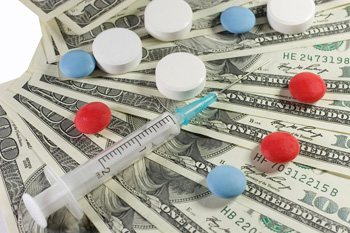
The main reason for the increase in pharmaceutical companies’ outsourcing is the challenge associated with drug development. The average cost of drug development can reach billions of dollars and it takes an average of 10 years to bring a new drug to the market. Many drugs have failed to be effective clinically and have never reached the market. Due to this risk involved, pharmaceutical companies are hesitant to utilize their onsite resources for research and development. However, outsourcing helps organizations in this sector to reduce both their operational and manufacturing costs and thereby minimize financial risk.
Current Pharmaceutical market
Research studies show that in 2016, an estimated $19.2 billion dollars were spent on outsourcing the discovery of pharmaceutical drugs. This increase was due to the rising demand for contract research organizations (CRO) as well as advancements in scientific discovery and technology. The outsourcing trend is expected grow 46.7 percent by 2021 in the development of new biologic entities, and may result in an overall expenditure of $72.7 billion over the 7-year period. The major sectors that are being outsourced are:
- Vaccines (51 percent)
- Blood factors (46 percent)
- Hormones ( 44 percent)
- Anti- body drug conjugates (42 percent)
The drug discovery outsourcing is expected to increase to $ 43.7 billion industry by 2026. The outsourcing sector is inundated with a huge amount of capital that continues to improve pharmaceutical outsourcing. Since many pharmaceutical companies are small and have very less capacity to perform research onsite or lack appropriate equipment to carry out Research & Development, outsourcing is important.
R&D outsourcing activities have become challenging to manage by pharmaceutical technical and R and D managers. Private contract research organizations and other academic organizations represent the primary outsourcing locations for pharmaceutical companies and many of these companies provide everything from drug discovery and structural analysis to phase 4 clinical trials.
Development of Drugs
Pharmaceuticals outsourcing is typically given to CROs (Contract Research Organizations), especially in the testing phase. Before any approval, clinical trials must be carried out in a controlled environment. Pharmaceuticals can outsource their sales and marketing to external vendors which helps to improve efficiency and optimize expenditure.
A leading biotechnology product development company, ThermoFischer, that will be exhibiting their range of spectroscopy products at Pittcon 2018, is an example of a company that provides outsourced drug development services to pharmaceuticals clients across the globe. Pharma- development services offered by outsourcing providers include drug discovery, drug development, X raying, N and C terminal sequencing and so on.
Pharmaceutical Testing
One of the main challenges related to pharmaceutical development is biopharmaceutical analysis. Onsite analyses are possible for large biopharmaceutical companies but the cost, time and equipment needed for the tests can be a burden on the company’s resources.
ThermoFisher provides pre-clinical and clinical drug testing that includes drug metabolite characterization to facilitate new compound and drug development. The organization depends on high resolution mass spectrometry technologies for detecting, profiling and quantifying metabolites. The company follows a reliable quality assurance and quality control protocol which includes multiple technologies and spectrometry to ensure consistency and identify impurities in pharmaceutical samples.
Electron paramagnetic resonance (EPR) spectroscopy is an important aspect of pharmaceutical testing. This helps researchers to gain insights into drug degradation and pharmaceutical companies can understand the shelf life of a product, which is important with regard to patient safety. Along with understanding a drug’s shelf life and potency, a drug stability test chamber is used by pharmaceutical outsourcing organizations to determine the strength under varying environmental conditions.
Pharma Outsourcing Is Boosting Contract Manufacturer Market
Contract manufacturing, also called “outsourcing” has become inevitable for drug manufacturing and the market is sky rocketing. According to a new report from BCC Research — Global Market for Contract Pharmaceuticals Manufacturing, Research and Packaging — this market will reach $136.4 billion and $197.0 billion in 2017 and 2022 respectively with a compound annual growth rate of 7.6 percent.
Outsourcing establishes a working agreement between two pharma companies and one company custom produces goods on behalf of its clients. This removes the burden on clients to maintain manufacturing facilities or purchase raw materials to produce the finished goods.
Pharmaceutical companies approach contract manufacturing organizations to maintain their positions in this highly competitive world. Outsourcing that has been transformed from “pay for services” to “partnership and collaborations” is considered the most successful strategy to bring innovation to the drug industry.
The highlights of the above mentioned BCC research are:
- The market for contract manufacture of bulk and dosage form drugs will grow from $74.8 billion in 2017 to $100 billion by 2022 at a CAGR of 6.2 percent.
- The global contract research market which summed up to $48.1 billion in 2016 is expected to achieve a 9.8 percent CAGR from 2017 to 2022.
- The growth demand for innovative, sustainable and eco-friendly packaging and serialization should drive a healthy growth rate (6.1 percent CAGR) in the contract packaging
According to BCC Research analyst and author of the report Shalini S Dewan, advancements in pharmaceuticals such as unit dose vials, anti- counterfeit measures, two-in-one prefilled vials, senior-friendly packaging and child-resistant packs are increasing growth in the contract packaging market. Pharmaceutical companies are investing millions of dollars in non-core packaging activities to meet market needs and packaging requirements. In the contract research market, outsourcing reduces development costs for pharma companies and they need not make investments for every part of drug discovery and development.
Innovations in pharmaceutical development depend on an approach that focuses on areas where unmet requirements exist. It is important that pharmaceutical companies realize the increasing shortage of successful drugs and focus on diversifying targeted therapies. Outsourcing research and development activities and focusing on implementing the right strategies that will help meet increasing requirements can ensure higher ROI and remarkable cost savings. The outsourced solutions must be obtained from experienced leaders in pharmaceutical development.



